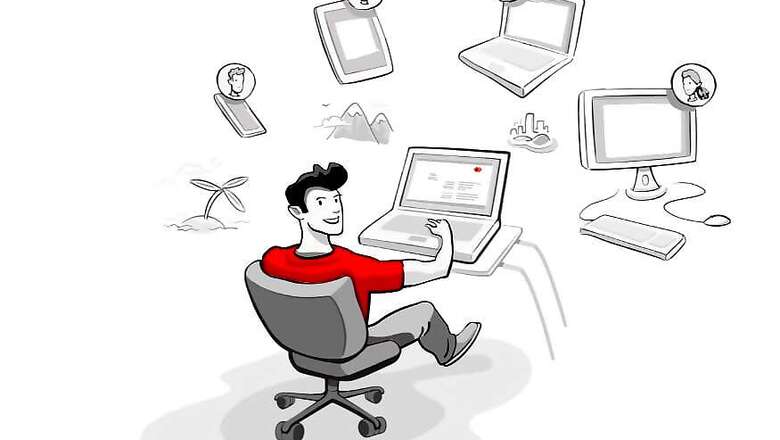
views
Editors' Note: The Industry Dialogue is a multi-part series by News18.com in which the industry talks about the impact of the Coronavirus pandemic and the challenges because of the COVID-lockdown, as well as the possible solutions and measures to get the economy back on track at the earliest.
The world has come to a grinding halt. The COVID-19 pandemic has changed life as we know it. With most countries going under lockdown, businesses are facing disruption like never before. But as they say, the show must go on. To ensure business continuity, companies are embracing a work from home model. In fact, we are witnessing a paradigm shift –previously working from home used to be the exception to the standard rule, now it is quickly becoming the new norm. Working from home is the ideal solution in our current situation, but it is not without challenges. Lack of communication, teamwork, direction are some of the major hindrances to working remotely. This means teams are not aligned and are unable to work together towards a common goal. Then there are also issues of interruptions at home, isolation for people who live alone, time management, etc. The good news is that modern employees are leveraging cutting edge technologies such as remote desktop software to not only overcome these challenges, but also increase their productivity.
How remote desktop is empowering employees
Remote desktop is software that enables employees to have access to their desktop environments and company resources from anywhere in the world – their own home, from the top of a mountain or even on a beach. Here are some brilliant use cases of this technology that is helping people work efficiently from home during the COVID-19 pandemic.
Communicate: Remote desktop software is helping employees communicate, engage and connect with colleagues. Whether it is seeking advice from their boss or brainstorming with team members, they are able to do it instantly and with ease.
Collaborate: One of the biggest benefits of remote desktop software when working from home is that it enables the workforce to come together as a team. Teams are able to discuss tasks, view and work on the same document together, transfer files and complete projects, just as they normally would in an office.
Host online meetings: Remote desktop makes meetings smoother and more effective. It enables large numbers of people to join in, present via shared screens, share ideas, record sessions and make informed decisions.
Connect to company network: Remote desktop tools are even facilitating mission-critical work from home by allowing employees to securely access files on company devices, servers and networks. This is not only helping business run as usual, but is also supporting growth.
Resolve IT issues: Employees are also able to get all the IT support they need. IT professionals are able to use remote access to maintain and monitor devices connected to the network, and quickly troubleshoot any issue that is hampering wok.
Catching up: It is not all work and no play. Employees are also using remote desktop software to catch up with colleagues after work. With anxiety and fear gripping everyone due to unprecedented COVID-19 scare, it is acting as a catalyst in helping people share stories, bond and become stronger as a community.
Why traditional organisations should get on board
While it is more organic and easier for tech-savvy companies to transition to remote working by leveraging modern tools, traditional businesses are finding a degree of friction making the transition. Nonetheless, the benefits of remote desktop software can be seen throughout several industries such as manufacturing, banking, etc. There are many business benefits that can be reaped by providing flexibility to their employees. First and foremost is the tremendous real-estate cost savings. By moving certain employees to a work from home model, businesses will require a smaller office with less support infrastructure. Investing in remote desktop solutions is significantly cheaper than maintaining a full-scale traditional set-up, positively and directly impacting the bottom-line.
Employees will be more productive and have a healthier state of mind as they will no longer waste time commuting. Moreover, by demonstrating trust, organisations will invariably see employees taking more ownership and giving their 100%. Lastly, as employees are able to effectively manage work-life balance, they will be happier, more loyal and genuinely invested in the growth of the company.
Remote working is the future
Should work from home be limited to the crisis we are facing? Definitely not! The way the world is moving, remote working is the future. Previously championed by start-ups and modern businesses, this new work culture is slowly getting a nod from big corporations too. The pandemic has pushed many businesses to move out of their comfort zone and has fast-tracked adoption of a work from home culture. Once this pandemic is behind us, working from home will hopefully become the new normal, leaving us agile, resilient and stronger – as people, as businesses and as a community.
About the Author:
Jessica Nash is the Product Marketing Manager at AnyDesk.




















Comments
0 comment